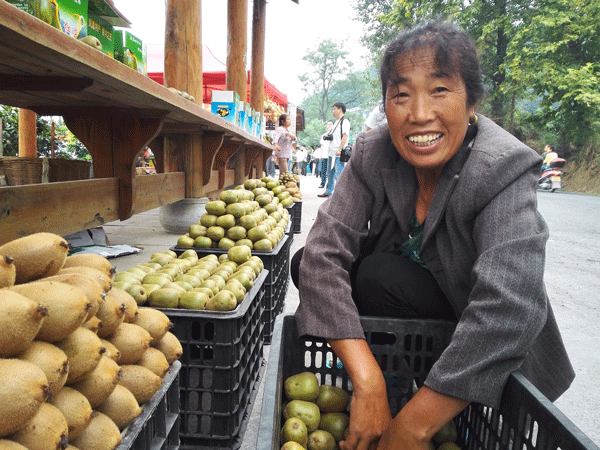


 |
|
A farmer sells kiwi fruits in Changputang village, Fenghuang county, Hunan province on Aug 31, 2016. [Photo by Xiao Yi/provided to chinadaily.com.cn] |
Wanna a free Kindle? Take this Long March quiz.
"If you have a daughter, don't marry her to any man from Changputang since nothing grows there except calamus."
This is a well-known saying in Fenghuang county, Hunan province for many years. However, finding a wife is no longer a concern for single men in the village now and the lands once occupied by calamus are now an orchard full of kiwi fruits, grapefruits and watermelons.
The Changputang village of Fenghuang county has a population of about 2,800. Most of the residents are of the Tujia ethnic group.
Before 1980s, the village was in extreme poverty due to limited land, lack of water and dilapidated roads. The per capita arable land was about two mu (0.13 hectares). The residents, with an annual average income of 600 yuan ($90), grew rice and corn for a living.
Since 1982, villagers began to grow crops such as watermelons and cucurbits.
"We didn't have confidence back then so we chose crops with short growing periods," said Wang Anquan, an official of Changputang. "Just in case they don't grow well, we could change to rice and corn." To his surprise, the venture was greatly successful.
Encouraged by their first experiment, farmers in the village introduced a special kind of tangerine from Zhejiang province, which brought an extra income of 2,000 yuan for every mu. Meanwhile, the income for rice was only 500 yuan per mu.
During the following years, the village further diversified its products with kiwi fruits and grapefruits.
In 2013, Chinese president Xi Jinping visited Changputang during an inspection tour.
Xi said that better technology and a bigger market are needed to improve agriculture in the village. He advised villagers to keep an eye on the market and look ahead. Xi also encouraged them to work harder.
In the same tour to southern Hunan, Xi said alleviating poverty in the region should be done with targeted policies, including improving agriculture and education.
Agriculture is the key economic engine in southern Hunan. From 2011 to 2012, the Ministry of Agriculture invested 1.23 billion yuan to boost development in the area. Today, southern Hunan is the largest base for lilies and kiwis in China.
Today, the Changputang village can produce 6.5 million kilograms of fruits worth 35 million yuan. The average net income has reached 7,000 yuan per year. The net income of 90 percent of the fruit farmers is above 30,000 yuan. Every family has tap water and cement roads.
Wanna a free Kindle? Take this Long March quiz.
